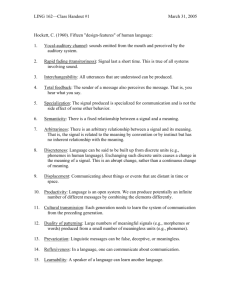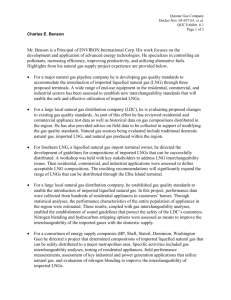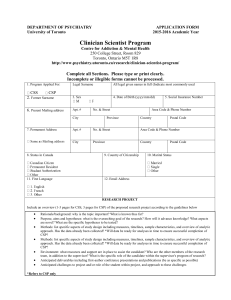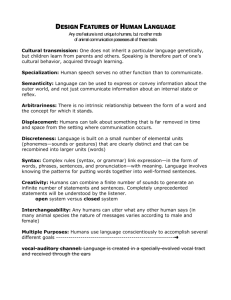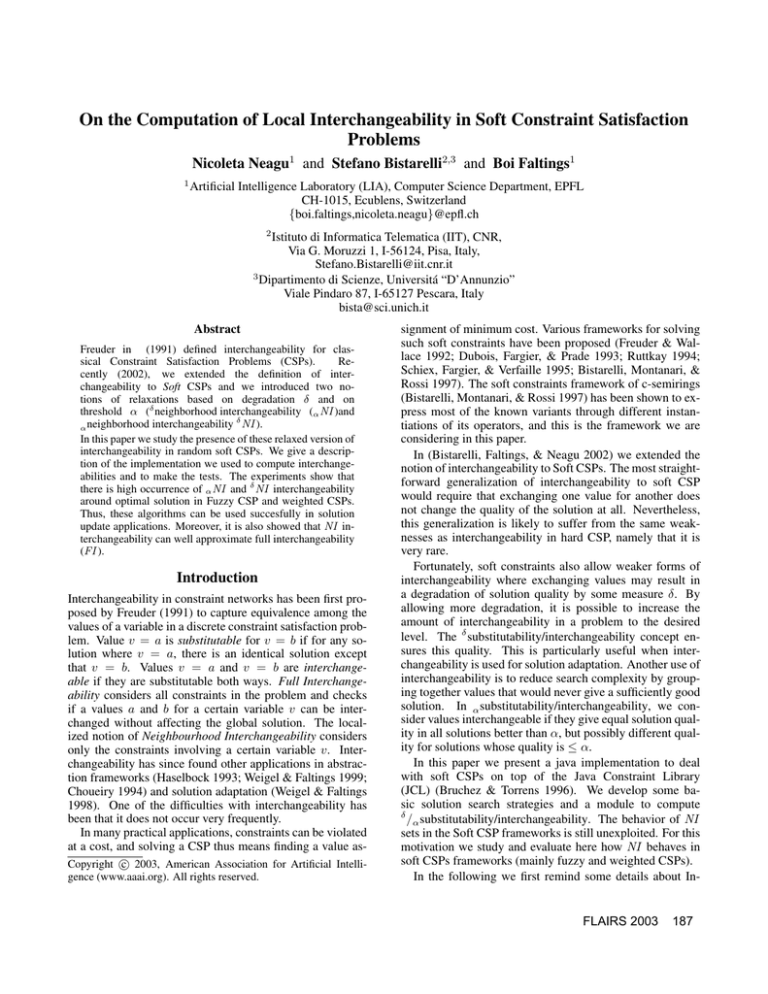
On the Computation of Local Interchangeability in Soft Constraint Satisfaction
Problems
Nicoleta Neagu1 and Stefano Bistarelli2,3 and Boi Faltings1
1
Artificial Intelligence Laboratory (LIA), Computer Science Department, EPFL
CH-1015, Ecublens, Switzerland
{boi.faltings,nicoleta.neagu}@epfl.ch
2
Istituto di Informatica Telematica (IIT), CNR,
Via G. Moruzzi 1, I-56124, Pisa, Italy,
Stefano.Bistarelli@iit.cnr.it
3
Dipartimento di Scienze, Universitá “D’Annunzio”
Viale Pindaro 87, I-65127 Pescara, Italy
bista@sci.unich.it
Abstract
Freuder in (1991) defined interchangeability for classical Constraint Satisfaction Problems (CSPs).
Recently (2002), we extended the definition of interchangeability to Soft CSPs and we introduced two notions of relaxations based on degradation δ and on
threshold α (δ neighborhood interchangeability (α NI )and
δ
α neighborhood interchangeability NI ).
In this paper we study the presence of these relaxed version of
interchangeability in random soft CSPs. We give a description of the implementation we used to compute interchangeabilities and to make the tests. The experiments show that
there is high occurrence of α NI and δ NI interchangeability
around optimal solution in Fuzzy CSP and weighted CSPs.
Thus, these algorithms can be used succesfully in solution
update applications. Moreover, it is also showed that NI interchangeability can well approximate full interchangeability
(FI ).
Introduction
Interchangeability in constraint networks has been first proposed by Freuder (1991) to capture equivalence among the
values of a variable in a discrete constraint satisfaction problem. Value v = a is substitutable for v = b if for any solution where v = a, there is an identical solution except
that v = b. Values v = a and v = b are interchangeable if they are substitutable both ways. Full Interchangeability considers all constraints in the problem and checks
if a values a and b for a certain variable v can be interchanged without affecting the global solution. The localized notion of Neighbourhood Interchangeability considers
only the constraints involving a certain variable v. Interchangeability has since found other applications in abstraction frameworks (Haselbock 1993; Weigel & Faltings 1999;
Choueiry 1994) and solution adaptation (Weigel & Faltings
1998). One of the difficulties with interchangeability has
been that it does not occur very frequently.
In many practical applications, constraints can be violated
at a cost, and solving a CSP thus means finding a value asc 2003, American Association for Artificial IntelliCopyright gence (www.aaai.org). All rights reserved.
signment of minimum cost. Various frameworks for solving
such soft constraints have been proposed (Freuder & Wallace 1992; Dubois, Fargier, & Prade 1993; Ruttkay 1994;
Schiex, Fargier, & Verfaille 1995; Bistarelli, Montanari, &
Rossi 1997). The soft constraints framework of c-semirings
(Bistarelli, Montanari, & Rossi 1997) has been shown to express most of the known variants through different instantiations of its operators, and this is the framework we are
considering in this paper.
In (Bistarelli, Faltings, & Neagu 2002) we extended the
notion of interchangeability to Soft CSPs. The most straightforward generalization of interchangeability to soft CSP
would require that exchanging one value for another does
not change the quality of the solution at all. Nevertheless,
this generalization is likely to suffer from the same weaknesses as interchangeability in hard CSP, namely that it is
very rare.
Fortunately, soft constraints also allow weaker forms of
interchangeability where exchanging values may result in
a degradation of solution quality by some measure δ. By
allowing more degradation, it is possible to increase the
amount of interchangeability in a problem to the desired
level. The δ substitutability/interchangeability concept ensures this quality. This is particularly useful when interchangeability is used for solution adaptation. Another use of
interchangeability is to reduce search complexity by grouping together values that would never give a sufficiently good
solution. In α substitutability/interchangeability, we consider values interchangeable if they give equal solution quality in all solutions better than α, but possibly different quality for solutions whose quality is ≤ α.
In this paper we present a java implementation to deal
with soft CSPs on top of the Java Constraint Library
(JCL) (Bruchez & Torrens 1996). We develop some basic solution search strategies and a module to compute
δ
/α substitutability/interchangeability. The behavior of NI
sets in the Soft CSP frameworks is still unexploited. For this
motivation we study and evaluate here how NI behaves in
soft CSPs frameworks (mainly fuzzy and weighted CSPs).
In the following we first remind some details about In-
FLAIRS 2003
187
terchangeability and soft Constraint Satisfaction Problems.
Then, we discuss the implemented system we use to compute (δ /α )interchangeability. A section describing the results of the tests follows. A conclusions and possible future
work section conclude the paper.
Soft CSPs
A soft constraint may be seen as a constraint where each
instantiations of its variables has an associated value from
a partially ordered set which can be interpreted as a set of
preference values. Combining constraints will then have to
take into account such additional values, and thus the formalism has also to provide suitable operations for combination (×) and comparison (+) of tuples of values and constraints. This is why this formalization is based on the concept of c-semiring S = A, +, ×, 0, 1, which is just a set A
plus two operations1 .
Constraint Problems. Given a semiring S
=
A, +, ×, 0, 1 and an ordered set of variables V over
a finite domain D, a constraint is a function which, given
an assignment η : V → D of the variables, returns a value
of the semiring.
By using this notation we define C = η → A as the set of
all possible constraints that can be built starting from S, D
and V . Consider a constraint c ∈ C. We define his support
as supp(c) = {v ∈ V | ∃η, d1 , d2 .cη[v := d1 ] = cη[v :=
d2 ]}, where
d
if v = v ,
η[v := d]v =
ηv otherwise.
Note that cη[v := d1 ] means cη where η is η modified
with the association v := d1 (that is the operator [ ] has
precedence over application).
Combining soft constraints. Given the set C, the combination function ⊗ : C × C → C is defined as (c1 ⊗ c2 )η =
c1 η ×S c2 η.
In words, combining two constraints means building a
new constraint whose support involve all the variables of the
original ones, and which associates to each tuple of domain
values for such variables a semiring element which is obtained by multiplying the elements associated by the original
constraints to the appropriate subtuples.
Interchangeability. In soft CSPs, there are not any crisp
notion of consistency. In fact, each tuple is a possible solution, but with different level of preference. Therefore, in this
framework, the notion of interchangeability become finer: to
say that values a and b are interchangeable we have also to
consider the assigned semiring level.
More precisely, if a domain element a assigned to variable
v can be substituted in each tuple solution with a domain element b without obtaining a worse semiring level we say that
b is
for a (that is b ∈ FS v (a) if and only
full substitutable Cη[v := b]). When we restrict this
if
Cη[v := a] ≤S
1
In (Bistarelli, Montanari, & Rossi 1997) several properties of
the structure are discussed. Let us just remind that it is possible to
define a partial order ≤S over A such that a ≤S b iff a + b = b.
188
FLAIRS 2003
notion only to the set of constraints Cv that involve variable
v we obtain a local version
of substitutability
(that is b ∈
NS v (a) if and only if
Cv η[v := b]).
Cv η[v := a] ≤S
When the relations hold in both directions, we have the
notion of Full/Neighborhood interchangeability of b with a.
This means that when a and b are interchangeable for variable v they can be exchanged without affecting the level of
any solution.
Degradations and Thresholds. In soft CSPs, any value
assignment is a solution, but may have a very bad preference value. This allows broadening the original interchangeability concept to one that also allows degrading the
solution quality when values are exchanged. We call this
δ
interchangeability, where δ is the degradation factor.
When searching for solutions to soft CSP, it is possible
to gain efficiency by not distinguishing values that could in
any case not be part of a solution of sufficient quality. In
α interchangeability, two values are interchangeable if they
do not affect the quality of any solution with quality better
than α. We call α the threshold factor.
Both concepts can be combined, i.e. we can allow both
degradation and limit search to solutions better than a certain
threshold (δα interchangeability). By extending the previous
definitions we obtain thresholds and degradation version of
full/neighbourhood substitutability/interchangeability:
• we say that b is δ Full Substitutable for a on v (b ∈
δ
FS v (a)) if and
Cη[v :=
only if for all assignments η,
Cη[v := b];
a] ×S δ ≤S
• we say that b is α Full substitutable for a on v (b ∈
FS
(a))
if
and
only
if
for
all
assignments
η,
Cη[v :=
v
α
a] ≥ α =⇒
Cη[v := a] ≤S
Cη[v := b].
The Java Implementation
We implemented the soft CSP module and the interchangeability module as an extension of the JCL, developed at the
Artificial Intelligence Laboratory (EPFL) (Bruchez & Torrens 1996). JCL is implemented in java which ensures portability on all the platforms. The library contain a CSP package describing constraint satisfaction problems and several
solvers. In this section, we describe briefly the JCL andthe
CSP module.
The Java Constraint Library. The Java Constraint Library (JCL) is a library containing common constraint satisfaction techniques which provides services for creating
and managing discrete CSPs and applying preprocessing and
search algorithms.
We developed two new packages on top of JCL: the first
one models and solve soft constraint satisfaction problems;
the second one computes interchangeabilities for crisp and
soft CSPs, see Figure 1.
The Soft CSP Module. The Soft CSP package extends
the CSP class in order to support softness. We implemented the scheme from (Bistarelli, Montanari, & Rossi
1997) where preferences levels are assigned both to variables values (implemented as soft unary constraints by the
class SoftUnaryConstraint) and to tuples of values
Data file = CSP
written in CSP
Description
Language
Classes for Interchangeability
Algorithms in CSPs
Classes for Soft CSP Modeling
Classes for Search
Algorithms in Soft CSPs
Data Parser
JCL CSP
Class
Classes for Interchangeability
Algorithms in Soft CSPs
Soft CSP Package
Interchangeability Package
JCL
Delta Interchangeabiltiy
Finder Class
Delta Value
Input
Alpha Value
Classes for Search Algorithms
Output
JCL
Alpha Interchangeability
Finder Class
Classes for CSP Modeling
Java Constraint Library (JCL)
Classes of
Delta/Alpha/NI
Interchangeable
Values
JCL
Neighborhood
Interchangeability
Finder Class
Figure 1: Soft CSP and Interchangeability Modules on top of Java
Constraint Language(JCL).
Figure 3: Interchangeability computation flow.
over the constraints. In particular, in the actual implementation we only consider binary constraints (by SoftBinaryConstraint), but the class can be easily extended in
this direction.
The Soft CSP package supports classical, fuzzy, probabilistic and weighted CSPs by using appropriate semirings
as showed in Figure 2. The semiring class parameterizes the
type of the CSP and the respective operations of constraints
combinations (and projection).
for the specified Delta and Alpha.
Interchangeability Finder
abstract class
Neighborhood
Interchangeability
Finder
Neighborhood Partial
Interchangeability Finder
Delta
Interchangeability
Finder
Alpha
Interchangeability
Finder
SoftCSP module
Soft Neighborhood
Interchangeability Finder
Delta Neighbourhood
Interchangeability Finder
Alpha Neighborhood
Interchangeability Finder
SoftCSP
Semiring
soft unary
semiring
soft binary
- interchangeability classes pour classical CSP based on Discrimination
SoftBinaryConstraint
SoftUnaryConstraint
- interchangeability classes pour soft CSP based on Discrimination Tree
- interchangeability classes pour soft CSP based on definition
JCL library
- subclass
CSP
Figure 4: Classes structures of Interchangeability Algorithms.
variable
unary
dom
Test Evaluation
binary
UnaryConstraint
CSPVariable
CSPDomain
BinaryConstraint
contains
subclass
Figure 2: The Soft CSP module.
The Interchangeability Module. After reading the Soft
CSP from a data file (we use to describe problem SCSPDL
an extension of the CSP Description Language (Bruchez &
Torrens 1996)) a Soft CSP java object is constructed. Each
CSP domain and variable is represented as an object. After
this, unary and binary constraints are created.
The next step is to give the SoftCSP object as input to
DeltaInterchangeability class (possibly with the
desired α and δ a tolerance factor) as shown in Figure 3.
Figure 4 describe the classes implementing the Neighbourhood Interchangeability algorithms implemented by the
Interchangeability Module. By now, this module supports
computation of NI sets for crisp CSPs and δ /α NI sets for
soft CSPs.
They are implemented in a way to ensure an easy extension to several interchangeability approximation and algorithms. For this motivation we implemented the abstract
class InterchangeabilityFinder which is extended
Occurrence of NI in classical CSP have been already studied to improve search (Benson & Freuder 1992), for resource
allocation application (Boi Faltings 1995) and for configuration problems (Neagu & Faltings 1999). One of the main
result is that in problems of small density the number of NI
sets increases with the domain size.
The behavior of NI sets in the Soft CSP frameworks is
still unexploited. For this motivation we study and evaluate
here how NI behaves in the Soft CSP framework.
We have done our experiments for fuzzy and weighted
CSP representing the important class of Soft CSPs dealing with an idempotent and non-idempotent times operation respectively. The motivation for considering both
classes come from the fact that solving Soft CSP when
the combination operation is not idempotent is extremely
hard (Bistarelli, Montanari, & Rossi 1997).
Usually the structure of a problem is characterised by four
parameters:
• Problem Size: This is usually the number of its variables;
• Domain Size: The average of the cardinality of the domain
of the variables;
• Problem Density: This value (measured on the interval
[0,1]) is the ratio of the number of constraints relatively
to the minimum and maximum number of allowed con-
FLAIRS 2003
189
straints in the given problem; Considering the constraint
problem as a constraint graph G = (V, E) where V represents the vertices (variables) (with n := |V |) and E edges
(constraints) (with e := |E|); the density is computed as
e−e min
denscsp = e max−e
min , where e min = n − 1 and
n(n−1)
;
2
e max =
• Problem tightness This measure is obtained as the average
of tightness of all the constraints. For soft constraints we
consider it as the ratio between the sum of the semiring
values associated to all the tuples in all the constraints,
and the value obtained by multiplying the 1 element of
the semiring (that is the maximum) for the number of all
possible tuple (that is the constraintnumber × domainsize.
(δ /α )NI in Fuzzy and Weighted CSPs
putes the average number of α NI (δ NI )interchangeable
pairs values over the whole problem, divided by the maximum potential number of relations using the formula:
n
αN IVk ∗2
measureδα N I =
k=1 domSizeVk ∗(domSizeVk −1)
,
n
where n represents the problem size and α NI Vk all the
α interchangeable pairs values for variable Vk .
measure NI
δ 1
0.9
0.8
0.7
0.6
0.5
0.4
For both fuzzy and weighted CSPs we observed that the density and number of variables do not influence much occurrence of interchangeable values. There is instead a (weak)
dependency from the domain size: the number of interchangeabilities increases with the resources. This result
from the test is obvious when dealing with crisp CSPs, but
for soft problems this could be not so obvious.
We followed the model of measuring NI sets developed
in (Boi Faltings 1995) with some adaptation needed in order
to deal with soft constraints. We report here the results for
problem sizes n = 10 and n = 20, while varying the density
dens − csp ∈ {0.1, 0.2, . . . , 1} and the maximum domain
n 2n
size dom − size = { 10
, 10 , . . . , 9n
10 , n}. For each case,
ten random problems were generated and then graphically
represented by considering the measures described below.
In all the graph we highlight where is the position of the
optimal solution. In fact, when dealing with crisp CSP there
is not any notion of optimality, but for soft CSP each solution has an associated level of preference. It is important to
study NI occurrence around optimal solutions because we
are often interested to discard solutions of bad quality.
δ
/α NI Occurrency in Fuzzy CSPs. In Figure 5 and in
Figure 6, we represent α NI and δ NI occurrency in Fuzzy
CSPs.
0.3
0.2
0.1
0
1
0.9
0.8
0.7
0.6
0.5
delta
0.4
0.3
0.2
0.1
0
optimal solution
Figure 6: Occurrence of δ interchangeability around optimal solution in fuzzy CSP.
measure NI
δ
1
0.9
0.8
0.7
0.6
0.5
0.4
0.3
0.2
0.1
0
0
50
optimal solution
100
150
200
250
δ
Figure 7: Occurrence of δ interchangeability around optimal solution in weighted CSP.
measure NI
α
1
0.9
0.8
0.7
0.6
0.5
0.4
0.3
0.2
0.1
0
0
0.1
0.2
0.3
optimal solution
0.4
0.5
0.6
0.7
0.8
0.9
1
alpha
Figure 5: Occurrence of α interchangeability around optimal solution in fuzzy CSP.
The parameters measureα NI (and measureδ NI ) com-
190
FLAIRS 2003
Similar results hold for δ /α interchangeability when dealing with weighted instead of fuzzy CSPs. In Figure 7, we
represent δ NI occurrency in weighted CSPs. Notice that
the shape of the function is the same to that of Figure 6 because we represent δ in decreasing semiring order which in
the fuzzy semiring (max-min) is opposite to the weighted
semiring (min-sum).
Looking at Figure 5, Figure 6 and Figure 7 we notice
that the number of α interchangeability increase with α and
that δ interchangeability decrease with δ (w.r.t. the semiring order). This experimental proof support the theorems
in (Bistarelli, Faltings, & Neagu 2002).
The experimental facts show also that there is high occurrence of α NI and δ NI interchangeability around optimal
solution in Fuzzy CSP and weighted CSPs. Thus, these algorithms can be used succesfully in solution update applica-
tions. The use of these technique to improve search have to
be investigated.
δ
NI versus δ FI Occurrency in Weighted CSPs. Since
NI computes a subset of FI , it is important to investigate
how many interchangeabilities we can find by computing
locally neighborhood interchangeabilities w.r.t. full interchangeabilities. In Figures 8 and in Figure 9 ratioN I/F I
represent the rate between Neighborhood and Full Interchangeability for fuzzy and weighted CSP respectively.
ratio NI/FI
1
0.9
0.8
0.7
0.6
0.5
0.4
0.3
0.2
0.1
0.2
By using this implementation, we have studied the occurrence of α NI and δ NI and we have evaluated how this occurrence can depend on the values of α and δ, and how local
NI relies with FI . The experimental facts show also that
there is high occurrence of α NI and δ NI interchangeability
around optimal solutions in Fuzzy CSP and weighted CSPs.
Thus, these algorithms can be used successfully in solution
update applications. Moreover, we also show that NI interchangeability can well approximate FI interchangeability.
The use of these technique to improve search have to be investigated.
We believe that the results prove the reliability for using
δ
interchangeability
for solution updating and motivate for
α
further studying. By now, the soft CSP module implements
only a basic solver which combines all the constraints of the
CSP and then projecting them over the variables of interest.
We leave for further work implementation of more performant solvers as the main goal of this study is analyse the
occurrence and behaviour of interchangeability in soft CSP.
0.3
0.4
0.5
0.6
1
0.7
0.6
0.8
density
0.8
0.4
0.9
δ
0.2
0
optimal solution
Figure 8: Neighborhood Interchangeability relatively to Full Interchangeability for δ interchangeability in Fuzzy CSP.
In our experiments we used the measure:
n δ
NI Vk
ratioN I/F I = k=1
n
δ
k=1 FI Vk
where δ NI Vk represents the number of δ NI interchangeable
values pairs for variable Vk and δ FI Vk represents the number of δ FI interchangeable values pairs for variable Vk .
In Figures 8 and 9, we see that the ratio δ NI /δ FI stays
between 0.7 and 0.9 around optimal solution for fuzzy and
weighted CSP as well. Thus, NI interchangeability can well
approximate FI interchangeability.
ratio NI/FI
1
0.8
0.6
0.4
0.2
0
0
0.2
200
0.4
150
0.6
100
0.8
density
δ
50
1
0
optimal solution
Figure 9: Neighborhood Interchangeability relatively to Full Interchangeability for δ interchangeability in Weighted CSP.
Conclusions and Future Work
In this paper we presented a java based implementation able
to represent soft CSPs and to compute interchangeability.
References
Benson, B., and Freuder, E. 1992. Interchangeability preprocessing can improve forward checking search. In Proc. of the 10th
ECAI.
Bistarelli, S.; Faltings, B.; and Neagu, N. 2002. A definition of
interchangeability for soft csps. In Proc. ERCIM/CologNet Workshop on Constraint - Selected Papers, LNAI. Springer-Verlag. to
appear.
Bistarelli, S.; Montanari, U.; and Rossi, F. 1997. Semiring-based
Constraint Solving and Optimization. J. ACM 44(2).
Boi Faltings, Rainer Weigel, B. C. 1995. Abstraction by Interchangeability in Resource Allocation. In Proc. of the 14 th
IJCAI-95, 1694–1701.
Bruchez, E., and Torrens, M. 1996. Java constraint library.
http://liawww.epfl.ch/ torrens/Project/JCL/.
Choueiry, B. Y. 1994. Abstraction Methods for Resource Allocation. Ph.D. Dissertation, EPFL PhD Thesis no 1292.
Dubois, D.; Fargier, H.; and Prade, H. 1993. The calculus of
fuzzy restrictions as a basis for flexible constraint satisfaction. In
Proc. IEEE International Conference on Fuzzy Systems.
Freuder, E., and Wallace, R. 1992. Partial constraint satisfaction.
AI Journal 58.
Freuder, E. C. 1991. Eliminating interchangeable values in constraint satisfaction problems. In Proc. of AAAI-91.
Haselbock, A. 1993. Exploiting interchangeabilities in constraint
satisfaction problems. In Proc. of the 13th IJCAI.
Neagu, N., and Faltings, B. 1999. Constraint Satisfaction for
Case Adaptation. In In Proc. of the workshop sesion (ICCBR99).
Ruttkay, Z. 1994. Fuzzy constraint satisfaction. In Proc. 3rd
IEEE International Conference on Fuzzy Systems.
Schiex, T.; Fargier, H.; and Verfaille, G. 1995. Valued Constraint Satisfaction Problems: Hard and Easy Problems. In Proc.
IJCAI95.
Weigel, R., and Faltings, B. 1998. Interchangeability for case
adaptation in configuration problems. In Proc. of the AAAI98
Spring Symposium on Multimodal Reasoning, Stanford, CA. TR
SS-98-04.
Weigel, R., and Faltings, B. 1999. Compiling constraint satisfaction problems. Artificial Intelligence 115.
FLAIRS 2003
191


